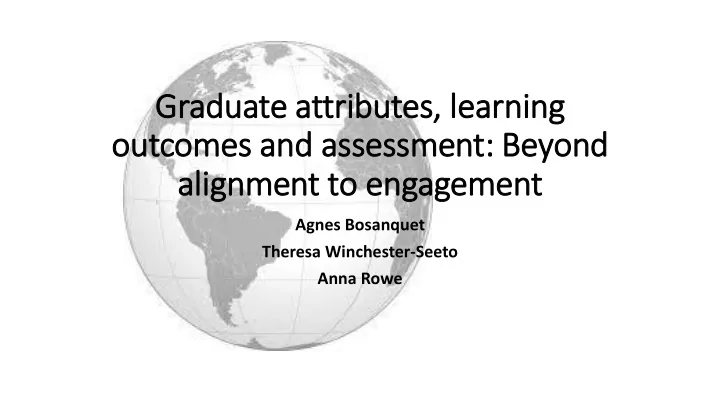

Graduate attributes, le learning outcomes and assessment: Beyond alignment to engagement Agnes Bosanquet Theresa Winchester-Seeto Anna Rowe
Overview of our research • Data = graduate attributes, 39 Australian universities, 20 year period • What is the intended curriculum at Australian universities? How has this changed over time? To what extent do graduate attributes align with teaching (enacted curriculum) and learning (experienced curriculum)? ( Marsh & Willis, 2007) • Previous analysis = social inclusion, student engagement, global citizenship
This study: • Alignment between graduate attributes, learning outcomes and assessment tasks • Random purposeful sample of 40 undergraduate units, 1 st year and 3 rd year, Business and Arts • Evaluated for passive, active, and/or critical engagement • Word frequency analysis (NVIVO)
Passive, active, critical Passive engagement = acquiring/ understanding knowledge. • E.g. “Become exposed to how models are implemented in MS Excel” or “Consider the social and political movements of the 1980s and 1990s” Active engagement = applying/ adapting knowledge. • E.g. “Confidently read and discuss financial publications” or “Engage in informed criminological discussion with staff and other students” Critical engagement = questioning/ creating knowledge. • E.g. “Critique the accounting profession’s contribution to society through discussion of ethical and professional conduct” or “ Analyse the values of your placement and whether you have integrated them into your own views and practices”
Comparison across year and discipline (% of learning outcomes in each category) 70 60 50 Percentage (%) 40 30 20 10 0 1st year 3rd year Arts Business Passive Active Critical
Comparison by discipline (% of learning outcomes in each category ) 70 60 50 Percentage (%) 40 30 20 10 0 Arts - 1st year Business - 1st year Arts - 3rd year Business - 3rd year Passive Active Critical
Word frequency analysis – 1 st year vs 3 rd year
Global citizenship (23 units) Global citizenship by discipline (% of relevant learning outcomes) Passive: “A sense of 80 the complexity and 70 importance of cross- 60 Percentage (%) cultural dialogue on 50 gender issues” 40 30 Critical: “Develop, 20 critique and advocate 10 legal policy reform 0 Passive Active Critical proposals in the area Arts Business of criminal justice” Assessment: written task (100%), participation (39%), exam (21%)
Global citizenship • 95% of Australian universities have global citizenship as graduate attribute • “soft” global citizenship education vs “critical” approach (Andreotti, 2006) • Soft = “raising awareness of global issues” or “greater awareness of problems” • Critical = “engagement with global issues and perspectives” or “independent/ critical thinking and more informed, responsible and ethical action” (Andreotti, 2006) • passive global citizenship is easier to implement (Shulz and Jorgenson, 2008) • passive global citizenship is a “politically neutral if not banal concept” (Caruana, 2010, p. 61)
References • Andreotti,V. (2006). Soft versus critical global citizenship education. Policy & Practice: A Development Education Review, 3 , Autumn, 40-51. • Bosanquet, A., Winchester-Seeto, T. & Rowe, A. (2012). Social inclusion, graduate attributes and higher education curriculum. Journal of Academic Language and Learning, 6 (2), 73-87. • Bosanquet, A., Winchester-Seeto, T. & Rowe, A. (2014). Conceptualising global citizenship: Analysing intended curriculum in Australian universities. In A. Kwan, E. Wong, T. Kwong, P. Lau & A. Goody (Eds.), Research and Development in Higher Education: Higher Education in a Globalized World, 37 (pp. 48-60). Hong Kong, 7 – 10 July 2014. • Caruana , V. (2010). Global citizenship for all: Putting the ‘higher’ back into UK higher education? In F. Maringe & N. Foskett (Eds.), Globalization and Internationalization in Higher Education: Theoretical, Strategic and Management Perspectives (pp. 51-64). London: Continuum. • Marsh, C. J., & Willis, G. (2007). Curriculum: Alternative approaches, ongoing issues . Upper Saddle River, NJ: Merrill Prentice Hall. • Shulz, L., & Jorgenson, S. (2008) Global citizenship in post-secondary institutions: A review of the literature . Retrieved from http://www.gccd.ualberta.ca/en/~/media/gccd/Documents/GCE_lit_review.pdf • Winchester-Seeto, T., Bosanquet, A., & Rowe, A. (2012). Smoke and Mirrors: Graduate attributes and the implications for student engagement in higher education. In I. Solomonides, A. Reid & P. Petocz (eds.), Engaging with Learning in Higher Education ( pp. 413-438). Faringdon: Libri Publishing.
Recommend
More recommend